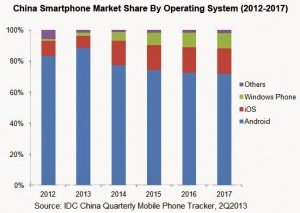Google’s android is by far the most popular operating system in the mobile space. Its dominance is even more relevant in the Chinese mobile market where it enjoys nearly 85% market share. However does market share necessarily translate to profits for Google in China? Or is this market entirely different?
China has over 1.2 billion mobile phone users out of which about 68% use internet on their devices (34.5% of these are 3G internet users), making it the largest mobile market in the world. Ironically though unlike in countries like India where Google is the preferred search engine, in China, the market dynamics are entirely different.
Baidu is the leader in the mobile search market with nearly 50% market share followed by companies like Qihoo and Tencent, which have gained market share in recent times. Baidu which has over 80% of the Chinese search market in PCs and laptops, is facing stiff competition from newer rivals like Tencent (which owns the popular WeChat messaging app) in the mobile market. Google search does not even seem to appear in the picture frame while considering this market.
To make matters worse for Google, hardly 5.6% of the android users in China use the Google Play store to download apps- clearly destroying the revenue stream for Google. In fact most mobile manufacturers as well as third party companies create their own app stores for the Chinese consumers. The fact that these third party app stores rule the market can be easily judged from the fact that Baidu last year acquired 91 Wireless, one of the popular app stores, for a whopping 1.9 billion USD. Now if you compare it with Instagram getting acquired by Facebook for 1 billion USD and Tumblr by Yahoo! for 1.1 billion USD – You will get the answer! An experiment of similar sort is also being undertaken by Indian mobile manufacturer Micromax which has its own mobile app store, whether it will be a success is yet to be seen.
So essentially is the market share in China having no relevance for Google? In China, most manufacturers are using android just as a base to build their own distinct operating systems and keep their selling costs low in a price sensitive market. This is where this market is inherently different from India and US where manufacturers do minimum customisations in the OS in their offerings.
However, in the midst of all this there is a company like Xiaomi which also uses the android platform, outsells Apple in China, produces products that are priced at a premium and that can one day challenge Google’s dominance in the mobile OS market. This is largely due to the level of customisation which often makes its users experience it as a new OS exclusively made for them. The company recently hired Hugo Barra, former Vice-President of Google, who was responsible for overseeing Android product management at Google. Xiaomi is presently targeting to enter the US and EU markets.
The popularity of Android, however is expected to face challenging times in China as its leading mobile service provider China Mobile has entered into a deal with Apple. The iOS is extremely popular as a platform among Chinese consumers, but it will be interesting to see the pricing strategy it adopts and how it will compete in a market dominated by low priced Android sets.
There are certain questions that the present situation raises:
–Why is Google not tapping into the Chinese market in terms of revenue, despite being the most popular platform?
–What happens to Google’s android platform when companies like Xiaomi start targeting the global market with their own android versions?
–What will be the impact on Google if third party app markets start becoming popular in countries like India- a major market for Google?
How should Google tackle this situation?
Firstly, Google should look at acquiring one of the popular third party app stores in China and integrate it with its offering in China. Secondly, Google should look at introducing its own Motorola phones and promote them in the Chinese market more aggressively- if high priced Apple can be expected to do well in China, why can’t Google get its act right?
It is ironic that in any market where Google is not the preferred search engine, Google tends to ignore the market potential. Its sheer apathy to the Chinese market exemplifies the fact. Furthermore, Apple is consistently trying to close the gap with a large number of ‘smart’ acquisitions last year like Topsy and Chomp, after having already replaced Google maps with Bing maps in iPhones. Can Google continue to ignore these developments? Can it continue to lose revenue opportunities in the world’s largest mobile market? Moreover, considering the gains Windows has made in the mobile market in 2013, it should also be factored in as a significant threat looking into the future!
Bottom-line: Google, it’s time to act in China! Can you manage it?
Food for thought: Should Microsoft promote creation of third party app stores in order to popularise the platform in China?

































